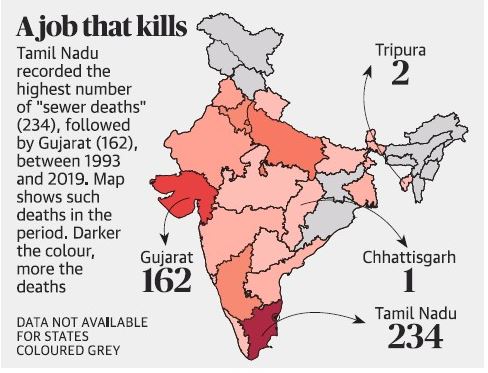Social Justice
Manual Scavenging in India
- 14 Jan 2020
- 4 min read
Why in News
- The Central Monitoring Committee to review the implementation of the Prohibition of Employment as Manual Scavengers and their Rehabilitation Act, 2013 has mentioned that many states are lagging behind in the rehabilitation of manual scavengers.
- Though most of the sewer death compensation had been paid but states like Gujarat, Maharashtra is yet to pay compensation.
Key Points
- Numerical Analysis:
- Since 1993, a total of 926 deaths related to the manual scavenging is reported in the country, out of which 172 families are yet to receive compensation.
- State-wise Analysis:
- Engaged Workers: According to the National Commission of Safai Karamcharis (NCSK), a total of 53,598 people, of which 29,923 were in Uttar Pradesh alone, had been identified as engaged in manual scavenging after surveys in 2013 and 2018.
- Deaths: Tamil Nadu reported the highest number of deaths but has paid compensation in all but seven of the 234 cases.
- Compensation: Gujarat has the highest number of cases where the compensation amount was not paid followed by Maharashtra.
- Steps taken for Elimination:
- Currently, one-time cash assistance, capital subsidy and skill development training are provided to the identified manual scavengers.
Prohibition of Employment of Manual Scavengers and their Rehabilitation Act, 2013
- Prohibition: The act prohibits the employment of manual scavengers, manual cleaning of sewers and septic tanks without protective equipment, and the construction of insanitary latrines.
- Rehabilitation: It seeks to rehabilitate manual scavengers and provide for their alternative employment.
- Implementing Authority: Each local authority, cantonment board and railway authority is responsible for surveying insanitary latrines within its jurisdiction. They shall also construct a number of sanitary community latrines.
- The District Magistrate and the local authority shall be the implementing authorities. Offences under the Act shall be cognizable and non-bailable and may be tried summarily.
Reasons for Persistence of Manual Scavenging
- Despite the most stringent penal provisions in the law against manual scavenging, it continues in parts of India largely due to governmental indifference and social prejudice.
- The continued presence of insanitary latrines, of which there are about 2.6 million that require cleaning by hand, according to Safai Karmachari Andolan.
- Many communities still regard the presence of a sanitary toilet inside the house as physical pollution.
- The entrenched belief in the caste system that assumes people belonging to a particular caste group will readily perform the stigmatised task of emptying latrines.
- The state governments are not keen to demolish and rebuild old facilities lacking sanitation, or conduct a full census of both the latrines and the people engaged in clearing such waste.
National Commission of Safai Karamcharis
- The National Commission for Safai Karamcharis (NCSK) was constituted on 12th August 1994 as a statutory body by an Act of Parliament viz. ‘National Commission for Safai Karamcharis Act, 1993’.
- The act “The National Commission for Safai Karamcharis Act, 1993” lapsed in February 2004.
- The Commission is acting as a non-statutory body of the Ministry of Social Justice and Empowerment whose tenure is extended from time to time through Government Resolutions.




